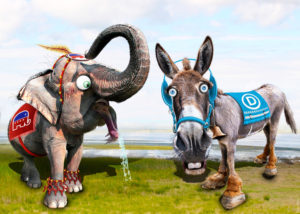The views that are expressed in the upcoming section do not represent the Clarion or Sinclair Community College. This paper, along with Sinclair, is nonpartisan. It does not endorse any candidate. The opinions given represent the viewpoint of the author who wrote the article.
The time has come. The culmination of so many months of debates, lost emails and trash talking to women is upon us. That’s right. It’s time for the election.
I should start off by saying that I’m not really into politics. Most of the time I don’t even care, but everyone has an opinion about everyone else.
So, this week I’m going to take what I know about being political and give all that advice to you wonderful readers.
The first thing to understand is that we live in a bi-partisan country. That means there are two parties – Republican and Democrat – that are constantly battling it out.
You have to pick a side. You can’t like some of the stances one party takes and some that the other party takes. If you do that you become an Independent, and no one really accepts them.
Essentially choosing one party over the other means you will lose friends and family members may disown you. You learn to accept it, or you just never bring up political discussions in order to keep your partisanship a secret.
You also don’t even really need to know what each party stands for. A lot of party members say they are Republican or Democrat because that’s how they were raised. Whatever keeps your stance alive, I say.
Sometimes people like to base their partisanship on their personal morals and ethics. That’s probably a good starting point.
You need to understand yourself in order to vote for someone that will lead and be the face of our country.
You want to vote for a candidate whose morals and ideals match up with yours.
Do you advocate for equal rights of all humans? Do you think global warming isn’t a real thing?
You have to ask yourself, then do research on the candidates to see who believes the same things as you.
Or you could be a demon spawn that doesn’t have any morals. In that case, I think you should do a write-in candidate.
(By the way, that’s when you vote for someone who isn’t on the ballot. Like Mayor McCheese for example.)
Money is also an important concept for being politically savvy.
Money is what makes the world go ‘round, except for the sun’s gravitational pull. That’s neither here nor there though.
Usually the candidate who has the most commercials and is seen the most is the one who has the most money. All this tells voters is that if you’re wealthy you can run a country.
No. Wrong. Incorrect. Most of the people in this country don’t have money; you don’t speak for us.

Anyway, most of the money political candidates get is from super PACs, or companies, unions and the like.
Money is also important when it comes to issues and stances on said issues. Do you want someone that wants to lower taxes for the middle-class? Do you think student loans should not be a thing anymore?
Since money helps us survive, you have to keep these types of questions in mind when trying to be political.
If you want to go the extra mile on becoming a political genius, you should take a political science class. Sinclair actually offers a few, and some are even on the Ohio Transfer Module.
I took one about the federal government. Surprisingly I learned a few things. I also learned that I didn’t care much about the workings of the federal government.
At least I know that Amendment 19 gave women the right to vote. Or that the 21st Amendment meant we could sell and transport alcohol and liquor again.
So, why is being political even relevant?
That’s easy. You live in this country just like everyone else, and unless you plan on moving to Canada you’re stuck with these governmental officials.
You might as well take a stance and have your voice heard.
You have no right to complain about who gets elected if you don’t utilize the rights given to you to make your voice and opinions heard.
Brittany Fletcher
Designer/Intern


